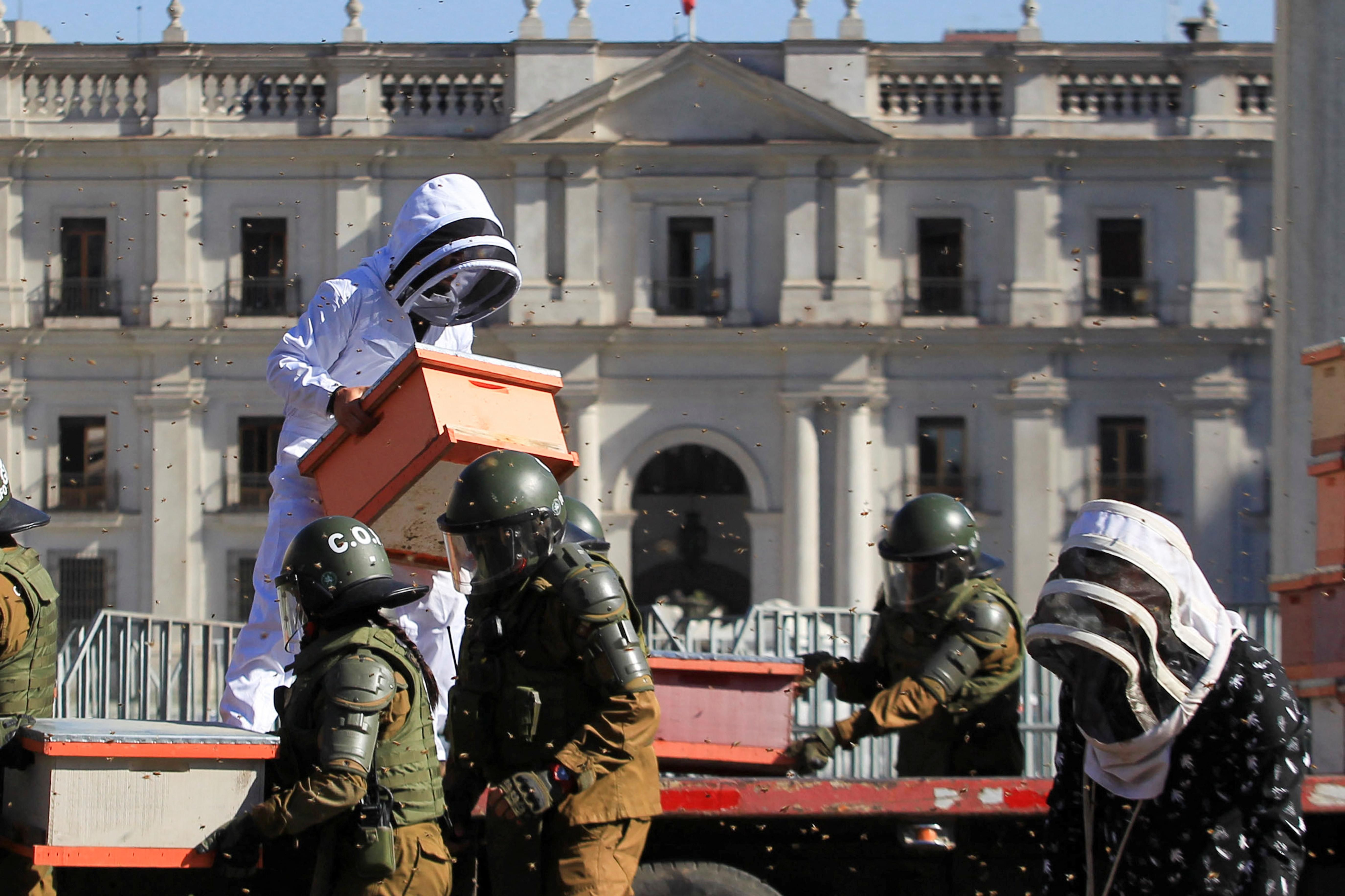January 04, 2022
Standing up for the bees in Chile. Chilean beekeepers demonstrated Tuesday outside the presidential palace in Santiago, calling for the government to provide more support for the ailing industry. The protesters set up on the street dozens of hives containing 10,000 bees to draw attention to their plight, and stop police from shutting down the rally. (At least seven police officers were stung.) Beekeepers say that a decade-long “megadrought” has ruined the crops and flowers needed to sustain bees — and they want the government to guarantee honey prices or provide subsidies for producers. This might seem like an obscure agriculture story, but it’s not: bees pollinate some of Chile’s major food exports like avocados, apples and almonds, and thus help sustain an industry worth a whopping $6.46 billion in exports in 2020. Although the government says it has been supporting some communities facing water shortages, the bee industry says it’s not enough. Disgruntled beekeepers might be in luck: the leftist Gabriel Boric, who supports expanding Chile's social safety net, will be sworn in as president in March.
Cigarettes for cabbage in Xian. Residents of the central Chinese city of Xian — some 13 million people — have been forced to stay in their homes since December 23, as Beijing continues to use draconian measures to contain new COVID outbreaks. Indeed, most residents are only allowed to leave their homes for testing, and rely on the state to hand out free groceries and other supplies. But many people say that spotty deliveries are leaving families hungry, while some essentials like medicines are scarce. (A dystopian video last week reportedly showed cops beating a man who left his home to buy steamed buns.) What’s more, residents have reportedly adopted a bartering system, exchanging goods like cigarettes and tech appliances for vegetables. Despite the changed nature of the pandemic, Xi Jinping is intent on pursuing a zero-COVID strategy that might have made sense in 2020 — but not so much in omicron-inundated 2022. Less than a month out from the Beijing Winter Olympics, what’s the CCP’s game-plan?
Détente between Turkey and Saudi Arabia? Middle East rivals Turkey and Saudi Arabia have been mired in tensions for years, which peaked in 2018 after the slaying of Saudi journalist Jamal Khashoggi by Saudi operatives in Istanbul. Now, in a major diplomatic breakthrough, Turkish President Recep Tayyip Erdogan says that he’ll visit Riyadh next month to meet with the country’s de-facto leader, Crown Prince Mohammed bin Salman. For years, the Saudis called on Ankara to stop supporting terror groups, citing Ankara’s close ties with Qatar, a Saudi foe. What’ll be on the agenda? Ankara, currently facing a collapsing currency, likely wants to patch things up so it can boost economic ties with Riyadh, including getting the Saudis to lift an unofficial boycott on some Turkish goods. Both sides are also keen to coordinate on regional geopolitics after the Biden administration’s withdrawal from Afghanistan and increasing disengagement from the Middle East. The signs of a détente are promising after Erdogan recently hosted MBS’ close pal, Abu Dhabi Crown Prince Mohammed bin Zayed, who pledged to invest billions of dollars in Turkey.
More For You
An employee cuts flowers inside a greenhouse, ahead of Valentine's Day, at Ayura Flowers, in Sopo, Colombia February 3, 2026.
REUTERS/Luisa Gonzalez
65,000: The tons of fresh-cut flowers that Colombia exported between Jan. 15 and Feb. 9 this year, ahead of the Valentine’s Day rush.
Most Popular
Think you know what's going on around the world? Here's your chance to prove it.
Russian President Vladimir Putin attends his annual end-of-year press conference and phone-in in Moscow, Russia December 19, 2025.
Sputnik/Alexander Kazakov/Pool via REUTERS
The Russian government has begun blocking the popular messaging apps WhatsApp and Telegram in a sweeping crackdown aimed at forcing Russians to use a state-backed alternative called MAX, which critics say would enable censorship and surveillance.
Donald Trump alongside Nigel Farage amid a television interview at his Trump Turnberry course in South Ayrshire during his visit to the United Kingdom, on May 3, 2023.
PA via Reuters
The US government will reportedly fund MAGA-aligned parties and think tanks in Europe. But with US President Donald Trump’s favorability in Europe so low, do they even want the money?
© 2025 GZERO Media. All Rights Reserved | A Eurasia Group media company.
